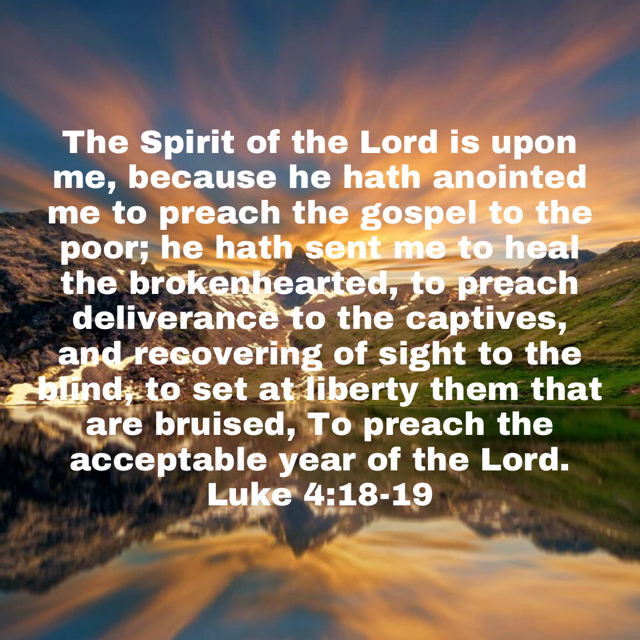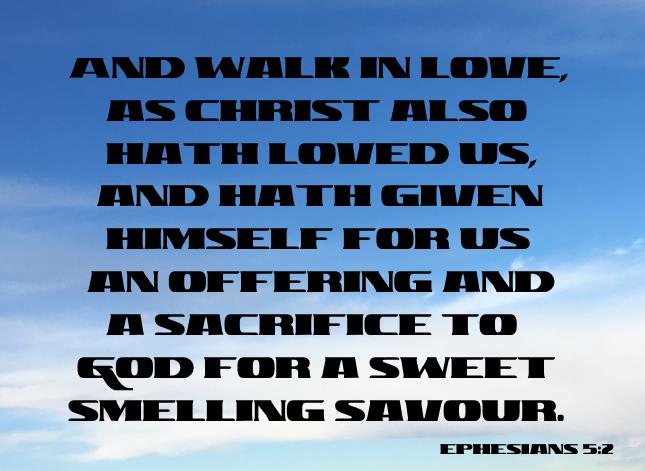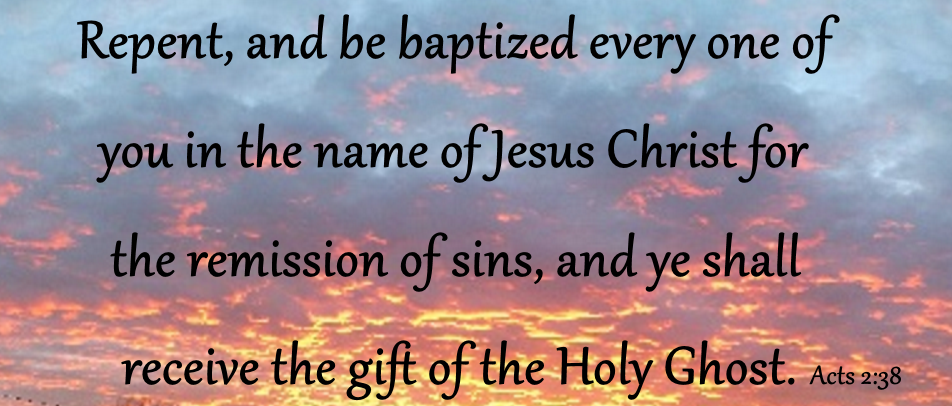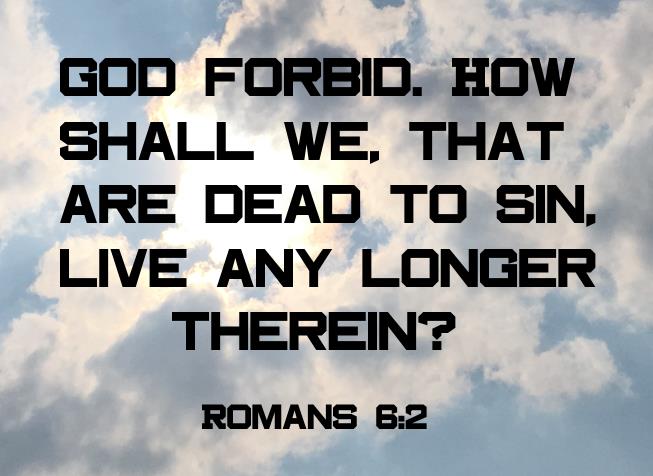Forgiveness
The word forgiveness in the Greek is aphesis (G859) and it means:
- release from bondage or imprisonment
- forgiveness or pardon, of sins (letting them go as if they had never been committed), remission of the penalty
In the King James Version, it is translated as remission (9x - Matthew 26:28, Mark 1:4, Luke 1:77, 3:3, 24:47, Acts 2:38, 10:43, Hebrews 9:22, 10:18), forgiveness (6x - Mark 3:29, Acts 5:31, 13:38, 26:18, Ephesians 1:7. Col 1:14), deliverance (1x - Luke 4:18) and liberty (1x - Luke 4:18).
Mission Statement
Jesus said:
The Spirit of the Lord is upon me, because he hath anointed me to preach the gospel to the poor; he hath sent me to heal the brokenhearted, to preach deliverance to the captives, and recovering of sight to the blind, to set at liberty them that are bruised. To preach the acceptable year of the Lord (Luke 4:18-19).
Without a doubt this was our great God and Savior's (Titus 2:13) mission statement. This mission was originally proclaimed or prophesied by Isaiah:
The Spirit of the Lord God is upon me; because the Lord hath anointed me to preach good tidings unto the meek; he hath sent me to bind up the brokenhearted, to proclaim liberty to the captives, and the opening of the prison to them that are bound; To proclaim the acceptable year of the Lord, and the day of vengeance of our God; to comfort all that mourn (Isaiah 61:1-2).
This mission statement is the knowledge and understanding, the what and the why - deliverance and liberty, respectively - using the word aphesis meaning release from bondage or imprisonment i.e. release from sin and from the control of satan. Jesus said He would preach good tidings, the Gospel.

Atonement (or Propitiation)
But "how did Jesus accomplish this mission?", is the question we want to address here. This question encompasses the remainder of the definition of aphesis - forgiveness or pardon, of sins (letting them go as if they had never been committed), remission of the penalty.
Prior to the birth of the Church (which was on the day of Pentecost - three and one-half years after He proclaimed this mission statement), forgiveness of sins could only be done by sacrificing animals for atonement or propitiation (to cover, purge, make an atonement, make reconciliation) of sin:
And he shall do with the bullock as he did with the bullock for a sin offering, so shall he do with this: and the priest shall make an atonement for them, and it shall be forgiven them (Leviticus 4:20).
This atonement had to happen yearly, it was not permanent - Leviticus 16:34.
As God, Jesus knew from the beginning of time that He would have to come to earth in the flesh to be slain (Revelation 13:8) to sacrifice Himself (Ephesians 5:2), shed His blood (Luke 22:20), to pay the ransom (1 Timothy 2:6) for our redemption (Hebrews 9:12), one time and one time only (Hebrews 7:26,27) for the atonement (Romans 5:11), or propitiation (1 John 2:2) of our sins.

Forgiveness
Did our salvation occur when He sacrificed Himself on the cross? Did we receive forgiveness (remittance) of sins when He died on the cross? The answer to these questions is NO! Yet, Jesus' work in His humanity was completed with His death on the cross - John 19:30. He shed His blood but it still needed to be applied to our lives. Forgiveness was yet to come and that is why Jesus, in his humanity, while He was being crucified, said to His deity:
.... Father, forgive them; for they know not what they do ... (Luke 23:34).
Which is exactly what He did the day of Pentecost, when salvation became available to all those who believe, those that obey the Gospel of Jesus Christ:
Then Peter said unto them, Repent, and be baptized every one of you in the name of Jesus Christ for the remission of sins (the forgiveness of your sins), and ye shall receive the gift of the Holy Ghost (Acts 2:38, Acts 2:38 ESV).
After we have repented, our sins from the past are remitted (forgiven), when we are baptized in the name of Jesus Christ, the only name under heaven whereby we can be saved (Acts 4:12). We then walk in newness of life:
Know ye not, that so many of us as were baptized into Jesus Christ were baptized into his death? Therefore we are buried with him by baptism into death: that like as Christ was raised up from the dead by the glory of the Father, even so we also should walk in newness of life (Romans 6:3-4).

Power of the Holy Ghost
Not only do we receive forgiveness of our sins when we obey the Gospel by obeying Acts 2:38, we also receive the gift of the Holy Ghost. Jesus called the Holy Ghost "power from on high":
And, behold, I send the promise of my Father upon you: but tarry ye in the city of Jerusalem, until ye be endued with power from on high (Luke 24:49).
The power of the Holy Ghost helps us to be overcomers, live righteously and mortify deeds of the flesh (1 John 4:4, Rom 8:4,13). How do we know we have the Holy Ghost? We speak in tongues, as the Spirit gives the utterance (Acts 2:4, 10:46, 19:6), just like it happened the day of Pentecost.
Return to Sin?
Do we want to return to sin after we have been saved by the grace and mercy of Jesus Christ? I don't think that anyone wants to return to a sinful life. The Apostle Paul says:
God forbid. How shall we, that are dead to sin, live any longer therein (Romans 6:2)?
The Apostle Peter says:
But it is happened unto them according to the true proverb, The dog is turned to his own vomit again; and the sow that was washed to her wallowing in the mire (2 Peter 2:22).
The author of Hebrews says those who willfully continue sinning are trampling on the Son of God and will be punished (Hebrews 10:26-31 NLT).

Even when we try our very best we still will sin. There has only been one human that was sin free - Jesus Christ. The Apostle John, in writing to believers (those that obeyed the Gospel of Jesus Christ) said:
If we say that we have no sin, we deceive ourselves, and the truth is not in us. If we confess our sins, he is faithful and just to forgive us our sins, and to cleanse us from all unrighteousness. If we say that we have not sinned, we make him a liar, and his word is not in us (1 John 1:8-10).
Over the eighteen years that I have been in church, I have seen many people backslide. It is not that all of a sudden one day they decide to go back to living a sinful life. The problem was that they didn't live a repentant lifestyle. They made a mistake in some way but didn't go to their altar to repent of their sin. After we are born again, if we make a mistake we need to repent, ask God for forgiveness, change course and get back on track and focus on seeking the kingdom of God and His righteousness.
Don't let that happen. Do your best! Lead and live a repentant lifestyle. If we repent, Jesus will forgive.




